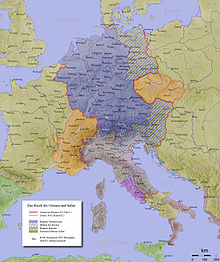Regnum Teutonicum
Kingdom of Germany (German Reich) or Regnum Teutonicorum (empire of the Germans or the Germans) is a term for the northern of the Alps part of the Holy Roman Empire . The term has been documented in the sources since the 11th century. In contrast to this, the term Regnum Italicum was used for imperial Italy .
Previously, and in some cases in parallel, terms such as Francia orientalis (eastern Franconian empire), trans rhenum (behind the Rhine), Austrasia or Germania based on the Roman provinces of the same name were used, although the areas named with them cannot be precisely defined geographically. In the 10th century, the term teutonicus , a Latinization of the concept of origin of today's word German , can be understood as a name for a language or a tribe. It only became more widespread in the 11th century, but not in official documents of the Roman-German rulers, but in the papal chancellery language. The background was highly political: the universal claim to rule of the Roman-German monarchy was increasingly contested by the papacy since the beginning of the investiture dispute in the 11th century; rather, the Pope should be entitled to universal rule over all spiritual and secular rulers. So the rex Romanorum (the official title of the Roman-German rulers) became the rex Teutonicorum , which the imperial side of course never adopted.
The term German appears in its Middle High German form from the 13th century primarily as a name for the language. It was not until the 16th century that the term Regnum Teutonicum was increasingly replaced by the term Germany .
literature
- Carlrichard Brühl : The birth of two peoples. Cologne u. a. 2001.
- Walter Mohr: From Francia Orientalis to Regnum Teutonicum. In: Archivum Latinitatis Medii Aevi. Vol. 27, 1957, pp. 27-49.
